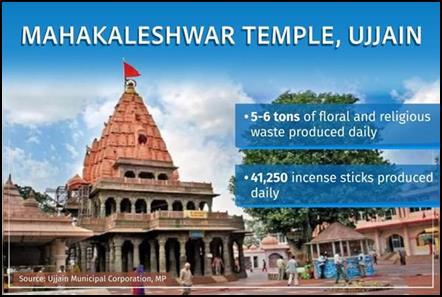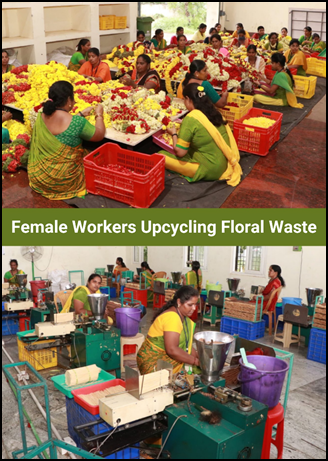Flower Power: India’s Temple Waste Transformation
Temple waste recycling, driven by Swachh Bharat, is turning flowers into jobs and sustainability
In the bustling city of Ujjain, as dawn breaks, thousands of devotees make their way to the Mahalakaleshwar Temple, offering vibrant flowers in a display of devotion. These flowers, rich in devotion, often meet an unfortunate fate, discarded into rivers or dumped in landfills. While many might think a single handful of flowers wouldn’t create much harm, Nachiket Kuntla, head of research and development at Phool.co, paints a different picture. “When an individual throws flowers into the river,” he reveals, “[he] thinks, ‘what harm can a handful of flowers cause?’ But we are a country of more than a billion people, so imagine the effect.”
Kuntla’s words resonate with the mission of the Swabhav Swachhata Sanskaar Swachhata (4S) campaign, launched to mark the 10th anniversary of the Swachh Bharat Mission. Running from September 17 to October 2, 2024, the campaign aligns with the annual Swachhata Hi Seva tradition, building up to Swachh Bharat Diwas on Mahatma Gandhi’s birth anniversary. By focusing on recycling floral waste from temples across India, the campaign embraces sustainability, turning what was once discarded into valuable resources.
 Coming back to Ujjain, the Mahalakaleshwar Temple, with its 75,000 to 100,000 daily visitors, produces an astounding 5-6 tonnes of floral waste each day. To tackle this, the temple introduced the ‘Pushpanjali Econirmit’ vehicles, which collect and transport floral waste to a 3-ton-per-day processing plant. The waste is transformed into organic products like compost, briquettes, and biofuels. Women from the Shiv Arpan Self-Help Group (SHG) have taken the lead, crafting over 30 million incense sticks and other eco-friendly items. Their efforts have not only helped reduce the temple’s environmental footprint but have also provided stable employment opportunities for many.
Coming back to Ujjain, the Mahalakaleshwar Temple, with its 75,000 to 100,000 daily visitors, produces an astounding 5-6 tonnes of floral waste each day. To tackle this, the temple introduced the ‘Pushpanjali Econirmit’ vehicles, which collect and transport floral waste to a 3-ton-per-day processing plant. The waste is transformed into organic products like compost, briquettes, and biofuels. Women from the Shiv Arpan Self-Help Group (SHG) have taken the lead, crafting over 30 million incense sticks and other eco-friendly items. Their efforts have not only helped reduce the temple’s environmental footprint but have also provided stable employment opportunities for many.
In Mumbai, the Siddhivinayak Temple faces a similar challenge with its 40,000 to 100,000 daily devotees. Floral offerings here range from 120 to 200 kilograms per day, which prompted ‘Adiv Pure Nature,’ a sustainable design house, to collaborate with the temple. They collect the waste thrice weekly, transforming it into natural dyes for textiles like scarves, garments, and linens. Utilizing a range of materials, from marigolds to coconut husks, this initiative showcases how temple waste can fuel artistic and ecological ventures.
Kanpur-based Phool.co, a trailblazer in the temple waste recycling space, collects approximately 21 tonnes of floral waste each week across major cities like Ayodhya, Varanasi, Bodh Gaya, and Badrinath. The company turns this waste into incense products and has also developed an innovative leather alternative, ‘Fleather,’ earning accolades such as PETA’s Best Innovation Award. Phool’s operations not only combat waste but also offer secure livelihoods to women who receive benefits such as healthcare, transportation, and provident funds.

In Hyderabad, HolyWaste is revamping the floral waste cycle through ‘Florjuvination,’ a process that turns flowers into soaps, incense sticks, and fertilizers. By collecting waste from 40 temples and market areas, the startup ensures that over 1,000 kilograms of floral waste per week doesn’t end up polluting water bodies or landfills.
Closer to the capital, Poonam Sehrawat’s Delhi-based startup, Aaruhi, processes over 1,000 kilograms of floral waste from 15 temples monthly. Sehrawat’s venture has trained more than 3,000 women to create eco-friendly products, generating significant income and fostering community development.
The story of India’s floral waste revolution is a powerful testament to the impact of collaboration. Across the country, cities, startups, and self-help groups are joining forces to create a cleaner, more sustainable future. The benefits are multifaceted—waste is diverted from landfills and waterways, creating a healthier environment, while women gain meaningful employment through these initiatives. At the same time, innovation thrives, giving discarded flowers a new lease on life.

From Ujjain’s Mahalakaleshwar Temple to Mumbai’s Siddhivinayak, the recycling of floral waste is not just an environmental necessity, but a testament to the power of collective effort. These projects are transforming temple waste into valuable resources, creating jobs and fostering ecological balance. As India continues its journey towards sustainability, campaigns like Swabhav Swachhata Sanskaar Swachhata (4S) are accelerating this mission. Together, the country is taking meaningful strides towards a cleaner, greener future—one flower at a time.
Danish Government Allocate Funds For the Purchase of a Ship to Strengthen the Monitoring of Critical Underwater Infrastructure.
Copenhagen; December 2025: Based on updated military recommendations from the Danish Defen…




















